|
|
|
Sort Order |
|
|
|
Items / Page
|
|
|
|
|
|
|
| Srl | Item |
| 1 |
ID:
145663


|
|
|
|
|
| Summary/Abstract |
‘Come, Make in India’, India’s Prime Minister has invited global firms to invest and manufacture in India and also to promote exports. As with this campaign, India has given a scope of promising growth to the companies which is also been seen to solve India’s multiple economic problems. Many countries have shown their interest to invest in India and one of them is South Korea. Now the question arises whether companies from South Korea in this competitive environment can mark their presence in India—a nation of cultural diversity, which can affect the initial start-ups, if ignored. Apart from the historical cultural ties, there are cross-cultural differences between South Korea and India. So, this paper aims to build up a study that brings together the parity and cross-cultural differences between South Korea and India. The paper opens with the discussion about the various historical, cultural and poetic relations to describe the scenario between the two countries, whereas for the analysis, a macro-meso-micro framework has been used to answer the research question. The three-level analysis helps this paper to see the overlooked influence of culture from a broader perspective. The results of the study reveal a list of cultural adaptations suited for South Korean start-ups to run businesses in India by avoiding the cultural threats and contribute to the existing literature. The study findings could be used by companies, marketers and practitioners to devise and re-vamp their strategies in India, and it will also serve as a cultural guide for them.
|
|
|
|
|
|
|
|
|
|
|
|
|
|
|
|
| 2 |
ID:
056665


|
|
|
| 3 |
ID:
111473
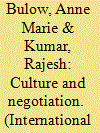

|
|
|
|
|
| Publication |
2011.
|
| Summary/Abstract |
The literature on cross-cultural negotiation has expanded considerably over the past few decades, but the findings are often ambiguous and sometimes even contradictory. This introduction highlights the critical areas where objections are commonly raised about the relevance of national culture, the applicability of typologies that treat cultures as static, and the problem of ambiguous terminology. It may not be surprising that studies contradict each other given the ambiguity of the national cultural construct and variations in the context of the negotiating situations that are studied. The articles in this issue contribute to deepening our understanding about cross-cultural negotiation processes.
|
|
|
|
|
|
|
|
|
|
|
|
|
|
|
|
| 4 |
ID:
127350
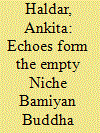

|
|
|
| 5 |
ID:
123285
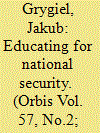

|
|
|
|
|
| Publication |
2013.
|
| Summary/Abstract |
National security is not simply a matter of technical skills and university degrees. To maintain power, engineering skills and knowledge of math are undoubtedly indispensable, but so is a solid understanding of, and appreciation for, the state's civilizational underpinnings-the religious beliefs, political ideals, and moral virtues. An education for national security must start from the desire to learn and understand one's own national culture and tradition to be able to identify what one is supposed to defend. And herein lies our biggest challenge: we are becoming increasingly more skilled at how to defend ourselves, but we are losing the tools to understand what we are expected to protect. We can do a lot but we are uncertain why we should.
|
|
|
|
|
|
|
|
|
|
|
|
|
|
|
|
| 6 |
ID:
128199
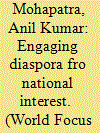

|
|
|
|
|
| Publication |
2014.
|
| Summary/Abstract |
The growing influence of diasporas on foreign affairs and the international behavior of the states has been a worldwide academic finding and a reported fact. As independent actors they have operated as lobbies which have actively influenced homeland (ancestral or kin-states) foreign policies and that of the host lands as well (Shain et al 2003). Especially the developing countries in their mission of development have tried to rope in their communities abroad in the process. This global phenomenon of diaspora-homeland linkage has debate on economic and political systems, national culture and international relations.
|
|
|
|
|
|
|
|
|
|
|
|
|
|
|
|
| 7 |
ID:
127260
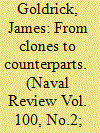

|
|
|
| 8 |
ID:
099054
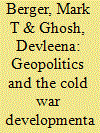

|
|
|
|
|
| Publication |
2010.
|
| Summary/Abstract |
Contrary to the view of some observers who insist that the Cold War was of limited or no relevance to the transition from colonies to nation-states after 1945 we argue that the geopolitics of the Cold War played a crucial role in shaping the character and direction of the trajectories of nation-states in Asia, if not the erstwhile Third World as a whole. More particularly, the geopolitics of the Cold War provided the crucial backdrop for the rise and fall of developmental nationalism, while the post-Cold War era has set the scene for an array of cultural nationalisms. These issues are explored with a particular focus on India. The case of India makes clear that it is impossible to separate the emergence of new nation-states and their success or failure after 1945 from the geopolitics of the Cold War. It will also make clear that the shifting geopolitics of the end of the Cold War reinforced the demise of developmental nationalism. Since the late 1980s, the problems facing the nation-states of the former Third World, are being played out in a geo-political context, which includes an important shift from developmental nationalisms to cultural nationalisms, while the nation-state system itself is sliding deeper into crisis against the backdrop of the global framework of 'genuinely existing' liberal capitalism and the changing geopolitics of the early twenty-first century.
|
|
|
|
|
|
|
|
|
|
|
|
|
|
|
|
| 9 |
ID:
141003


|
|
|
|
|
| Summary/Abstract |
Like any other country Russia has certain interests it follows in domestic and foreign policy. Can those interests be regarded as national interests? This is a crucial question in a multiethnic country that has never associated its identity with a specific nationality. In the Soviet era the authorities were keen to position themselves as a proxy of the "Soviet people," and today they are acting similarly on behalf of the people of Russia. But what is really behind these terms? The existence of an integral nation in imperial, then Soviet, and currently federative Russia has always been a matter of justified doubt. So, if that is the case, then the interests of what nation are called national?
|
|
|
|
|
|
|
|
|
|
|
|
|
|
|
|
| 10 |
ID:
099848


|
|
|
|
|
| Publication |
2010.
|
| Summary/Abstract |
This article elaborates on the concept of national reproduction as a means of analysing how national categories were redefined and adjusted in the political process that led to the establishment of the National Library of Norway. Three different forms of national reproduction may be distinguished in this process: the adjustment of cultural and territorial hierarchies within the nation-state in the 1980s; the consolidation of the national community by defining it in contrast to the "foreign" in the 1990s; and the definition by the political elite of a "new national we" that includes the "foreign" after the turn of the millennium.
|
|
|
|
|
|
|
|
|
|
|
|
|
|
|
|
| 11 |
ID:
119466
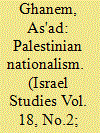

|
|
|
|
|
| Publication |
2013.
|
| Summary/Abstract |
A ccording to the literature there are two types of nationalism: First, Civic (territorial) nationalism emphasizes the common territory and citizenship as the criteria for individualsâ?? inclusion in the national group. 1 Here the national group is the totality of citizens, with no emphasis on their primordial ethnic affiliation; the national culture consists chiefly of civic and universal values. This kind of nationalism is found in France, Great Britain, and the United States. Civic nationalism crystallizes under the shadow of attempts to establish hegemony for the dominant group culture, values and basic beliefs.
|
|
|
|
|
|
|
|
|
|
|
|
|
|
|
|
| 12 |
ID:
111927
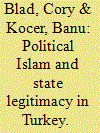

|
|
|
|
|
| Publication |
2012.
|
| Summary/Abstract |
The rise of Islamist parties to positions of political dominance in Turkey has been the subject of inquiry for scholars and concern for some American and European observers. This paper argues that this rise of Islamist political efficacy is the result of efforts to maintain state legitimacy in an era of neoliberalism. The integration of neoliberalism as a dominant political economic ideology reduces state economic regulatory capacities and social service endowment. The effect of this retrenchment is a commensurate reduction in state legitimation, as national populations view the state as unable-or unwilling-to meet requisite economic protectionist demands that were formerly exchanged for legitimate support. In an attempt to retain legitimate authority, neoliberal states are forced to move beyond economic protectionist strategies and embrace increasingly cultural legitimation approaches. We juxtapose the use of economic protectionist strategies in the 1945-1980 period with the integration of Islam as a cultural legitimation strategy following the 1980 coup in Turkey.
|
|
|
|
|
|
|
|
|
|
|
|
|
|
|
|
| 13 |
ID:
125902


|
|
|
|
|
| Publication |
2013.
|
| Summary/Abstract |
The 2011 protest wave, encompassing the Arab Spring revolutions, the Indignados movement in Spain and Greece, and the Occupy Wall Street movement has often been described as a new global protest cycle. However, the dynamics of diffusion suggest a more complex picture. Transmission of protest frames and repertoires from one country and cultural region to another was quite slow and tortuous. Moreover, adoption of the new ideas and practices of protest spawned by the protest wave of 2011 involved laborious dynamics of cultural translation and domestication. This situation points to the continuing importance of local protest cultures and cultural contexts, in addition to channels of transmission, even in an era of instantaneous communication technologies.
|
|
|
|
|
|
|
|
|
|
|
|
|
|
|
|
| 14 |
ID:
077245


|
|
|
|
|
| Publication |
2007.
|
| Summary/Abstract |
This article addresses the use of contacts and informal networks in the political sphere in post-communist states in East Central and South East Europe. It tests two major hypotheses: (i) informality is functional and mainly a result of transition; and (ii) informality is embedded in the national culture and/or a leftover from communism. These hypotheses are tested on findings from 360 in-depth elite interviews. The article concludes that although informality is largely a response to problems and opportunities caused by transition, the manner in which it is expressed, to quite some extent, reflects the national culture and communist experience.
|
|
|
|
|
|
|
|
|
|
|
|
|
|
|
|
| 15 |
ID:
122525


|
|
|
|
|
| Publication |
2013.
|
| Summary/Abstract |
A product of science, religion, and national culture, cosmism is reflected in academic and popular views about our place in the universe, space exploration, and human destiny. Although linked historically to the Russians, cosmism captures many aspects of American thinking about space. The present comparison shows that prophets, prophecies, striving for perfection, utopian visions, and hopes for salvation are evident in both Russian and American thought, but that there are also differences. Geert Hofstede's cross-cultural research on national values-power distance, individualism, masculinity, and uncertainty avoidance-is useful for understanding Russian-American differences. Russian acceptance of power inequalities, collectivism, concern for group welfare, and aversion to uncertainty lead to constellations of beliefs and emotions about spaceflight that differ from those bred by American egalitarianism, individualism, obsession with personal achievement, and acceptance of uncertainty. Both Russian and American thinking include occult and paranormal phenomena, but Americans have been more reluctant to assimilate such influences within mainstream science. As a concept, American cosmism captures the occasional blurring of the lines between religion and science in discussions of humanity's place in the universe and future in space.
|
|
|
|
|
|
|
|
|
|
|
|
|
|
|
|
| 16 |
ID:
142939
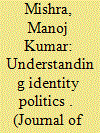

|
|
|
| 17 |
ID:
101817
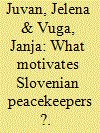

|
|
|
|
|
| Publication |
2011.
|
| Summary/Abstract |
This article is based on the results of longitudinal research on the motivations and expectations of members of the Slovenian Armed Forces participating in peace operations from 2003 to 2009. The analysis is based on three main approaches. The first is to distinguish between two groups of soldiers: those deployed to missions abroad on a voluntary basis, and those deployed to missions by order. The second approach is to distinguish between those deployed for the first time, and those who have already participated in peace support operations (PSOs) before. The third approach aims at distinguishing between three types of soldiers' motivation for PSOs according to Battistelli's typology. The importance of the different groups of motivation would to a certain degree also vary depending on the national culture, organizational culture and the individual soldier, as well as the time at which the survey was conducted: prior to deployment, during deployment or after returning home.
|
|
|
|
|
|
|
|
|
|
|
|
|
|
|
|
| 18 |
ID:
144205
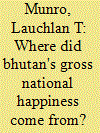

|
|
|
|
|
| Summary/Abstract |
The Kingdom of Bhutan has attracted international attention for adopting “Gross National Happiness” (GNH) as its national development policy. The central notion is that gross national happiness is more important than gross national product; the four pillars of GNH are sustainable economic development, good governance, preservation of the natural environment and preservation of the national culture. This paper traces the historical origins of the concept of Gross National Happiness and finds that GNH is newer than the literature and the propaganda usually suggest. Close study of GNH's origins and salience over several decades reveals evidence of the invention of a tradition, in Hobsbawm and Ranger's terms [Eric Hobsbawm and Terence Ranger (Eds.), The Invention of Tradition. Cambridge: CUP, 1983]. The meteoric rise over the last 15 years of GNH as Bhutan's official ideology is a key part of the Bhutanese state's efforts at nation building in the context of rapid and disruptive social and economic change in a highly plural society.
|
|
|
|
|
|
|
|
|
|
|
|
|
|
|
|
|
|
|
|
|